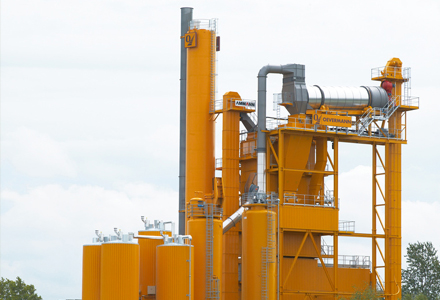
The reuse of old asphalt is set to increase rapidly, with predictions that one day it will be possible to utilise 100% of the 'waste'
The use of reclaimed asphalt has been on the increase for some years, but according to asphalt plant producer
The Swiss-based international company claims that more than 500million tonnes of reclaimed asphalt pavement (RAP) produced in 2008 was perfectly useable with the quality of the mineral and filler being unchanged (only the bitumen had hardened).
"Yet the process of thermal softening and hardening is reversible, thanks to bitumen's thermoplastic properties," said Ammann, which is also predicting that the current global asphalt production of 1.4billion tonnes per year will more than double in the coming years, brought about to some degree by a shift in asphalt production for road maintenance.
Indeed, it has been estimated that to achieve global economic equilibrium, some seven road networks, each with a length of 7million km (similar to those in the USA and 'old' Europe), will be needed, and this massive task will involve the use of existing materials as well as new.
All manufacturers are now able to offer standard or bespoke asphalt plants that can incorporate various amounts of RAP, and it has been claimed that 100% recycled asphalt will become the global standard with road maintenance being closely linked to such recycling.
According to the UK's WRAP (Waste & Resources Action Programme): "Asphalt can be recycled back into hot asphalt, a process which gains the benefit from the original bitumen and high quality aggregate, or into cold lay foamed bitumen, which is growing in popularity." There are a number of methods for adding reclaimed asphalt during the mixing process, and each varies the amount of material that can be recycled.
For example, RAP can be added to the heated elevator of a plant with the new minerals being heated to a higher temperature than is conventionally used, offering a simple installation with low initial costs involved. Around 15% of reclaimed asphalt can be used, with the resulting mix being used for base layer and possibly as a binder.
Up to 20% reclaimed asphalt can be included where the material is added to the drying drum, using a chute, belt or ring. Water vapour disappears in the drying drum and the material is metered by a belt scale. This is a relatively low cost installation that can only really be used as a bypass operation.
Where the local roadway specifications allow, reclaimed asphalt can be used in much higher amounts. If the asphalt is added directly to the mixer itself, up to 30% of reclaimed material can be used, with the new material being heated to a higher temperature than normal to account for the cold reclaimed material.
Another, and very successful, method calls for hot reclaimed asphalt to be added to the mix via a parallel drum system. The heating of the material is completely independent and it can also be separately metered and buffered. Water is vaporised in the parallel drum and the new mineral can still be screened. In this type of operation up to 60% reclaimed asphalt can be used in any recipe mix that is approved for the country of operation, leading to a greatly reduced cost for minerals and for bitumen.
Ammann Group's Universal S has a mixing output of up to 400tonnes/hr, and the "conceptional integration of the parallel drum system enables the addition of up to 60% of recycled asphalt."
However, with greater use of reclaimed asphalt suitable storage for the material is critical, including cover for material to prevent caking and reduce maintenance. Laboratory control is also an issue as the higher the proportion of reclaimed asphalt, the more important its quality becomes, as fewer new minerals will be able to change the composition of the mixture.
With roads having an average lifespan of 10-30 years there will always be a requirement for replacement or repair work, and this produces asphalt rubble and chippings, both of which can be reclaimed and reused in new road surfaces.
RSS













